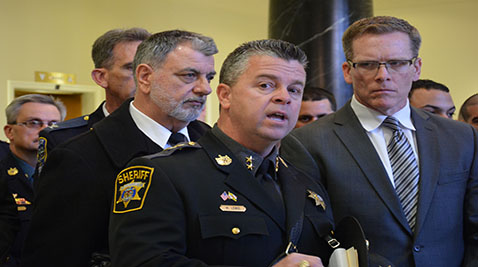ANNAPOLIS – Dozens of uniformed law enforcement officials from around Maryland showed up at the state capital on Thursday to push back against advancing efforts by some legislators to loosen the state’s marijuana laws.
“We as legislators, we as law enforcement officers, we have a duty and a responsibility to protect our children,” Wicomico County Sheriff Mike Lewis said at a hearing before the House Judiciary Committee.
Lewis and other opponents also voiced concerns about the dangers surrounding marijuana earlier in the day during a press conference, which at one point erupted into an angry debate between one speaker, substance abuse consultant Mike Gimbel, and a handful of marijuana reform supporters who were gathered outside the committee room where the hearing was held.

The debate inside the packed committee room became equally tense at times as lawmakers weighed measures that would either decriminalize small amounts of marijuana or legalize it outright for people 21 and older.
A bill sponsored by a gubernatorial candidate, Delegate Heather Mizeur, D-Montgomery, would reduce the use or possession of up to one ounce of marijuana from a criminal offense to a civil one punishable by a fine of up to $100.
A similar decriminalization bill sponsored by Sen. Robert Zirkin, D-Baltimore County, is set to receive a vote in the Senate on Friday.
Mizeur, who has expressed support for full legalization, spoke earlier in the day at a rally where nearly 100 people gathered outside the State House in support of easing the state’s marijuana laws.

But law enforcement officials attempted to fight back against what recent polls indicate is growing public support for legalization and decriminalization measures, urging lawmakers to use caution.
Many voiced fervid opposition to the legalization measure being pushed by Delegate Curt Anderson, D-Baltimore, which would regulate and tax marijuana like alcohol.
The proposal, which is awaiting a vote in committee on the Senate side, would make it legal for Marylanders to possess as much as an ounce of marijuana and own as many as six marijuana plants.
Anderson and supporters said that government regulation of marijuana would take power away from drug dealers and weaken organized crime. It would also do a better job of restricting underage residents’ access to the drug and ensuring that people aren’t exposed to a product that may be laced with more dangerous substances.
But some law enforcement officials refuted those notions and warned of unintended consequences that may prove harmful.
“You can rest assured, if [marijuana is] legalized in the state of Maryland, there will be … a black market for those Mexican cartel members, who now dominate the industry here in the United States,” Lewis said. “We will never stop the Mexican cartel. We would do nothing but open up the floodgates if it’s legalized in the state of Maryland.”
Lt. Tom Woodward of the Maryland State Police urged lawmakers to consider that marijuana legalization could lead to a potential increase in impaired driving.
“How many people are going to get injured or killed out our roadways because we can’t effectively deal with the increased presence of marijuana on our roadways?” Woodward said.
Opponents also argued that a change in the law might hinder the ability of officers to conduct important searches on the basis of marijuana odor.


You must be logged in to post a comment.